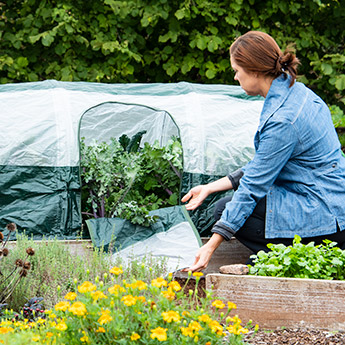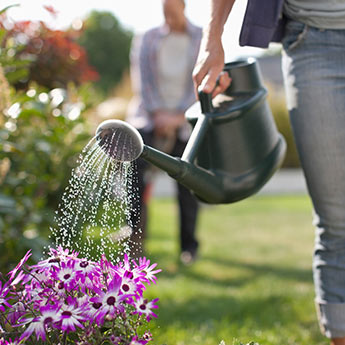Hey Rube! Where's the Rhubarb??
-
Helpful Products from Gardens Alive!
-
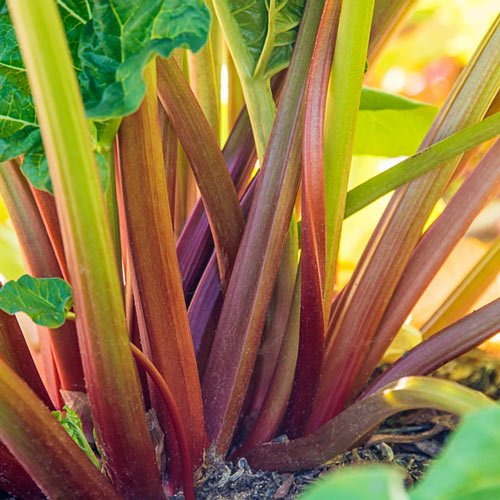 Glaskin's Perpetual Rhubarb
Glaskin's Perpetual Rhubarb -
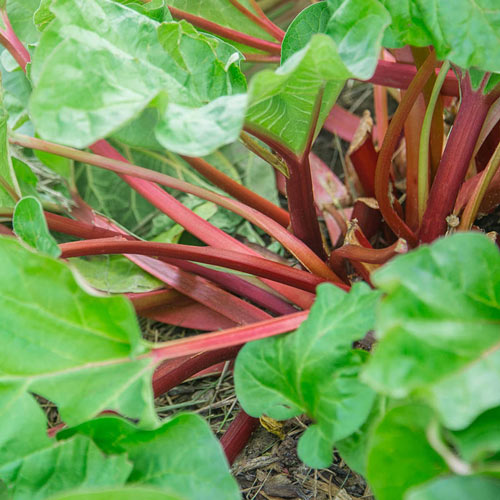 Hardy Tarty™ Rhubarb Plant
Hardy Tarty™ Rhubarb Plant
Q. Christa in Telford, PA writes: "Apparently, rhubarb is the easiest thing in the world for anyone to grow except me. I was told to mix my existing soil with Mushroom soil, which I did, watered it well and after 45 days it starts to wilt and just dies. I spend quite a bit on rhubarb every Spring in the grocery store and just love it, but I have no luck growing it. PLEASE HELP!"
A. Before we answer, let's discuss the fascinating word 'rhubarb'. I had learned back at Temple University's School of Communications and Theater that the word is used to help audiences imagine a great number of people milling about. If it was a stage play, everyone not on the stage would gather right behind the set and loudly mumble 'rhubarb' over and over. If it was radio, everyone not on the air would fill the room and do the same.
Then I heard it used differently at a travelling carnival when a large group of 'townies' was roaming around the midway looking for trouble. The guy working the crooked 'knock the milk bottles down' game yelled "Hey Rube" and the crowd was quickly outnumbered by the show's acrobats and roustabouts. Years later, I was able to use this magical phrase to make sure the carnies knew I was on their side when trouble began to fester near the Tilt-A-Whirl on a hot and humid Saturday night.
Then, doing more research than any sane person would deem necessary, I discovered that this tactic dated back to ancient Greek theatre, when actors on stage would warn their fellow thespians that a disruptive crowd was in the audience, using a word that loosely meant 'barbarians', and which eventually morphed into 'rhubarb'.
I can't remember exactly when I first heard it used to describe a fight on the baseball field, but the Phillies were my hometown team and it probably happened when I was darn young, as their nickname was 'the Fighting Phils' and we had at least two pitchers in the bullpen whose only job was to throw at people who had ticked us off, thrown at one of our guys, or we just felt like it.
The phrase classically describes what occurs when a member of the opposite team physically attacks an opposing player, as after a perhaps-too-hard take-out slide; or when a sissy batter takes umbrage at a pitch that would have taken his head off had he not dropped down to roll around in the tobacco juice-stained dirt. If he started marching towards the mound with bat still in hand, a rhubarb ensued. Hall-of-Fame Broadcaster Red Barber is credited with first using the term.
At any rate, the rhubarb now under discussion is the only vegetable we eat as a fruit. It is related to buckwheat, loves cold winters, rich soil and for its roots to be divided every five years or so. Planted in the fall, root divisions will produce edible spears by year three. Be sure to wait until those stems are a bright cherry red before harvesting, and trim off every bit of the poisonous leaves before mixing the chopped-up stems with an inordinate amount of sugar to make a rhubarb pie.
Harvest by twisting the stalks off with your hands; don't use a knife. And be patient when picking; the brighter red, the better this faux fruit will taste. Do not harvest at all the first year and maybe try a few stems the second year. Every year thereafter should bring a better harvest, until year five, when the plant should be divided. (You might be able to acquire local planting stock if you can find someone about to divide their rhubarb.)
Remember; we're planting in the Fall, not the Spring. And always leave half of the spears unharvested to capture sunlight to fuel the following year's crop, just like that other perennial vegetable, asparagus.
A notoriously heavy feeder, rhubarb is typically planted in full sun in an area with good drainage in soil that is rich with completely composted horse manure. Because its kind of a grain (like its cousin buckwheat), it wants a lot of nitrogen and not much else. That's why the classic rhubarb food is well-composted horse manure (NOT fresh!). Poultry manure should also work well.
Some varieties can set seed, which is bad. If you see seeds setting (say THAT five times real fast, kats and kittens), cut 'em off. They'll just rob energy from the root system.
That leaves us with our listener's choice of "mushroom soil" for the original planting material. A locally available resource in South Eastern PA ('The mushroom growing capital of the world!'), mushroom soil can either be 'fresh' (right out of the mushroom house and hot as Hades) or 'aged', when it is allowed to cook down until it is cooler and less offensive to the olfactory senses.
Fresh mushroom soil is so hot that it could easily burn new plants. And "Conventional" mushroom soil could have been treated with herbicides during the growing phase and/or fungicides at the end to ensure that you don't become an accidental competitor. Aged mushroom soil from an organic supplier would be ideal, but completely composted horse or poultry manure is better and much more available.
A. Before we answer, let's discuss the fascinating word 'rhubarb'. I had learned back at Temple University's School of Communications and Theater that the word is used to help audiences imagine a great number of people milling about. If it was a stage play, everyone not on the stage would gather right behind the set and loudly mumble 'rhubarb' over and over. If it was radio, everyone not on the air would fill the room and do the same.
Then I heard it used differently at a travelling carnival when a large group of 'townies' was roaming around the midway looking for trouble. The guy working the crooked 'knock the milk bottles down' game yelled "Hey Rube" and the crowd was quickly outnumbered by the show's acrobats and roustabouts. Years later, I was able to use this magical phrase to make sure the carnies knew I was on their side when trouble began to fester near the Tilt-A-Whirl on a hot and humid Saturday night.
Then, doing more research than any sane person would deem necessary, I discovered that this tactic dated back to ancient Greek theatre, when actors on stage would warn their fellow thespians that a disruptive crowd was in the audience, using a word that loosely meant 'barbarians', and which eventually morphed into 'rhubarb'.
I can't remember exactly when I first heard it used to describe a fight on the baseball field, but the Phillies were my hometown team and it probably happened when I was darn young, as their nickname was 'the Fighting Phils' and we had at least two pitchers in the bullpen whose only job was to throw at people who had ticked us off, thrown at one of our guys, or we just felt like it.
The phrase classically describes what occurs when a member of the opposite team physically attacks an opposing player, as after a perhaps-too-hard take-out slide; or when a sissy batter takes umbrage at a pitch that would have taken his head off had he not dropped down to roll around in the tobacco juice-stained dirt. If he started marching towards the mound with bat still in hand, a rhubarb ensued. Hall-of-Fame Broadcaster Red Barber is credited with first using the term.
At any rate, the rhubarb now under discussion is the only vegetable we eat as a fruit. It is related to buckwheat, loves cold winters, rich soil and for its roots to be divided every five years or so. Planted in the fall, root divisions will produce edible spears by year three. Be sure to wait until those stems are a bright cherry red before harvesting, and trim off every bit of the poisonous leaves before mixing the chopped-up stems with an inordinate amount of sugar to make a rhubarb pie.
Harvest by twisting the stalks off with your hands; don't use a knife. And be patient when picking; the brighter red, the better this faux fruit will taste. Do not harvest at all the first year and maybe try a few stems the second year. Every year thereafter should bring a better harvest, until year five, when the plant should be divided. (You might be able to acquire local planting stock if you can find someone about to divide their rhubarb.)
Remember; we're planting in the Fall, not the Spring. And always leave half of the spears unharvested to capture sunlight to fuel the following year's crop, just like that other perennial vegetable, asparagus.
A notoriously heavy feeder, rhubarb is typically planted in full sun in an area with good drainage in soil that is rich with completely composted horse manure. Because its kind of a grain (like its cousin buckwheat), it wants a lot of nitrogen and not much else. That's why the classic rhubarb food is well-composted horse manure (NOT fresh!). Poultry manure should also work well.
Some varieties can set seed, which is bad. If you see seeds setting (say THAT five times real fast, kats and kittens), cut 'em off. They'll just rob energy from the root system.
That leaves us with our listener's choice of "mushroom soil" for the original planting material. A locally available resource in South Eastern PA ('The mushroom growing capital of the world!'), mushroom soil can either be 'fresh' (right out of the mushroom house and hot as Hades) or 'aged', when it is allowed to cook down until it is cooler and less offensive to the olfactory senses.
Fresh mushroom soil is so hot that it could easily burn new plants. And "Conventional" mushroom soil could have been treated with herbicides during the growing phase and/or fungicides at the end to ensure that you don't become an accidental competitor. Aged mushroom soil from an organic supplier would be ideal, but completely composted horse or poultry manure is better and much more available.
-
Helpful Products from Gardens Alive!
-
 Glaskin's Perpetual Rhubarb
Glaskin's Perpetual Rhubarb -
 Hardy Tarty™ Rhubarb Plant
Hardy Tarty™ Rhubarb Plant





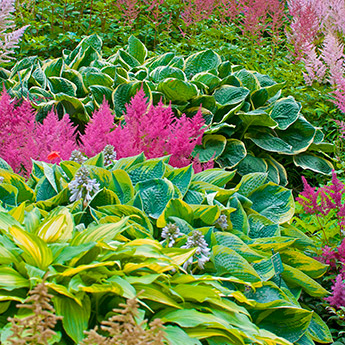
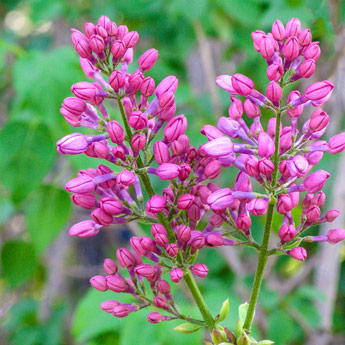
 Gardens Alive! & Supplies
Gardens Alive! & Supplies